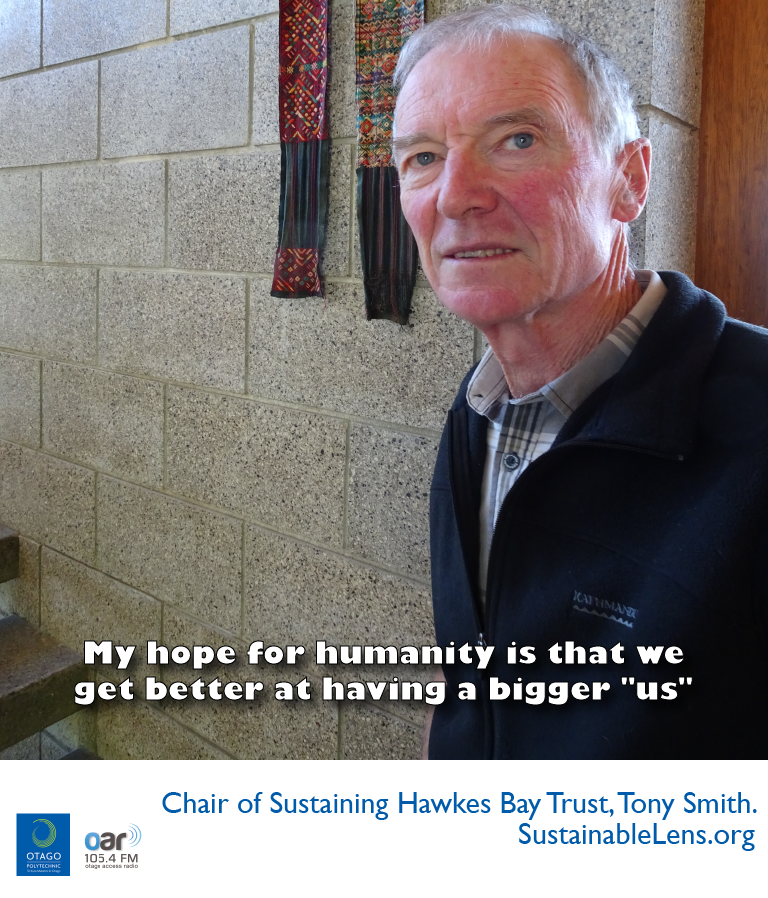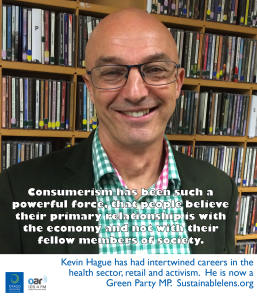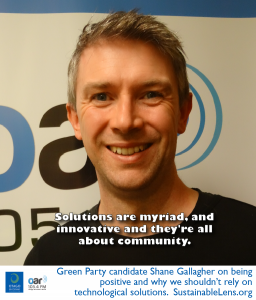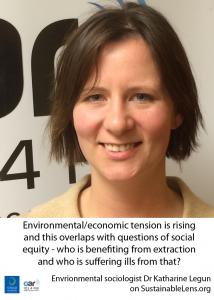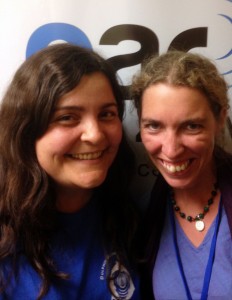
Sustainability is a way of thinking and a way of being. It’s a way of embodiment, it has nothing to do with study, it has nothing to do with opinion, it has to be with way that you be, that you are.
David McKay is a researcher at University of Otago’s CSAFE. His recently completed PhD thesis considers the relationships between MÄori cultural perspectives and environmental education policy or practice.
Talking points
As a science and technology based society we tend to assume that technology can solve everything and tend to overlook that we are a biological species and part of the environment rather than separate to it
We tend to overlook the gap between cause and effect in nature that tends to be from twenty and fifty years. So If I do something I won’t know the consequences for about 50 years, in management we tend to manage for about five years…
Fifty year management plans start to acknowledge the ecological gap
(David Orr) teachers need to be specialised generalists
Our problems started when we began to think we were bigger than nature, we got too big for our boots.
The environment doesn’t have a crisis, humans have a crisis.
It’s a bit like a learner surfer – a grommet – out in the big surf and not noticed that all the experienced surfers have gone in before the waves start dumping , in our society we’ve got an invisible wave building, we don’t know how big it is going to be, we don’t know when it is going to crash,but there’s nothing surer than it’s going to crash – there’s going to be consequences for the history that we have, its just a matter of whether we survive or not. That’s why I’m interested in resilience.
We used to have worms on the footpaths after rains, that doesn’t happen any more, but no one is literate enough of the environment to stop and wonder why. That’s an indicator, worms are in soils that are healthy, if there are no worms than our soils aren’t healthy – we manicure everything, nuke our gardens lawns and parks to control what we call pests…the trouble is they’re not discriminate, they kill the pests they kill the worms… and if the chemicals we put in the garden are doing in the worms in the garden it’s doing in you as well.
No one wants to hear what really needs to be said and done because it’s telling that naughty kid that they can’t play with the stick anymore. Same consequences, just more serious than breaking windows – we’re talking about survival and continuance here. We break this environment, evolution is going to carry on with or without us, what we’re playing with is whether we are going to be a part of that or not.
When the consequences are there, it’s too late. 20-50 years of damage and symptoms building up, it’s going to take at least that to undo it.
Environmental Education, Education for Sustainability, it doesn’t matter what you call it, it’s common sense
What does make sense is learning for survival and continuance with integrity
Understandings of environmental education amongst practitioners
There’s nothing in the (environmental education) literature that anything like matches up with the “old ways”.
People interpret the curriculum in a western point of view rather than a holistic view
Could we come up with a multi-cultural paradigm?
For many people the environment is something magical, out there, away from where we are. This totally overlooks that not only are we – you and me – in the environment right now, we are the environment.
Engagement and connection is what’s missing.
We haven’t lost the connection…we’ve forgotten it. We just forgotten that we are part of all that is. we haven’t lost anything, we’re not disconnected, we’ve forgotten what we are.
We are inextricably interconnected, interrelated and interdependent on all that is.
We lose sight of this simplicity – and that’s what we need to rediscover.
Elders tend to speak less, but more cryptically. When they do speak it’s a good idea to listen.
It is part of multi-culture that it is cryptic, there are levels of understanding of the same message. Education is about readiness, if you are up to getting the message then so be it, if you’re not then nothing is wasted.
A taonga said to me “you pakeha fellas, You measure the readiness of our young people by them giving the right answer – what the system wants – we measure readiness by our young people by them asking the right questions, and that is a different thing entirely”.
A very important to learning in traditional MÄori ways is critical thinking and individual identity, and having the mana and self confidence to be yourself, and stand to your rights and ask those questions and if it doesn’t match up, to disagree.
Living and learning as the environment or as part of, rather than in the environment, about the environment or even for the environment.
People coming from cooperative societies (the marae)… walking with feet very firmly in both worlds, and that’s something awesome.
In many cultural worlds time has no meaning…but timing is everything.
(David interviewees were) aghast at the thought that anyone could think the other way – how could you not understand that you are related to everything – we are all stardust.
Learning is about actualising the potential of being the best of the best of who you can be, and because it is about being the best of who you can be, and we can never be the same, we can never be taught the same things. In a crisis we all know something a bit different, we all know each others’ strengths and we can all work together very strongly…makes a very strong and resilient community.
Model:
Whakapapa, more than genealogy – it’s about learning about relationships/li>
Self identity
Survival skills
Community cohesion
Transferal and continuance
Everyone is a teacher, everyone is a learner. Learning is a life journey
I don’t agree that you have to go to pristine areas – ‘the hills are alive with sound of music’ – no, it’s about understanding that we are biological beings and part of ecology. Pure and simple, if you don’t get that then there is no such thing as sustainability.
We’re learning for well being, and if you’re well then you can be resilient, a little bit of flexibility and adaptability, and then you can survive, and then you can continue.
It’s like the car accident mentality – it can’t possibly happen to me”, well it is happening, except it’s not an accident, we are causing the disaster.
Activist? Not really. Educator. I have a reputation for saying what needs to be said, and not necessarily politely. But frankly we haven’t got time to be polite.
Challenges: Help shift the paradigm.
Advice: Get out on streets rather than facebook.
Resources
David Orr
Educating as if the earth matters
Soil erosion rate is about 10 times faster than the rest of the world (PCE report)
Matauranga taio:
Guidelines for Environmental Education in NZ
